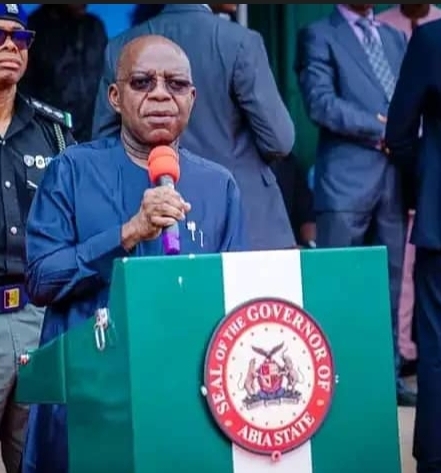By Oluebube A. Chukwu
As the wave of nationwide protests against economic hardship and poor governance continues to sweep across Nigeria, Southeastern states stands out for its notable absence from the demonstrations: Abia State under the guidance of Governor Alex Otti, the people of Abia have chosen a different path, opting for dialogue and constructive engagement rather than taking to the streets.
Across the country, protests have erupted in response to widespread dissatisfaction with the government’s handling of the economy. In Abuja, thousands of demonstrators took control of the Federal Secretariat Complex after being blocked from accessing Eagle Square. Despite the heavy-handed response from security agencies, which included the use of hundreds of teargas canisters, the protesters regrouped and continued their march.
In Zamfara State, youthful protesters blocked major streets in Gusau, demanding the reinstatement of fuel subsidies and the reopening of borders to allow the free flow of food items. In Osun State, residents braved early morning rain to voice their discontent, marching through Osogbo’s streets and defying the elements to make their voices heard.
Tragically, the protests have turned violent in some areas. In Maiduguri, Borno State, four residents were killed by soldiers during the demonstrations. This followed a 24-hour curfew imposed by the Borno government after a deadly bomb explosion in Kawori Market, suspected to have been carried out by Boko Haram.
Similar unrest was reported in Jigawa State, where hoodlums attacked and burned down government infrastructures in Hadejia. The discontent spread to other parts of the country, including Potiskum in Yobe State, Jos in Plateau State, and Kaduna, where major roads were blocked by massive crowds.
In Niger State, hundreds of travelers were stranded on the Abuja-Kaduna highway due to roadblocks set up by protesters. Major roads in Edo and Lagos States were also obstructed by demonstrators, causing significant disruptions.
Abia’s unique response is a testament to Governor Otti’s Leadership,
in stark contrast to the nationwide unrest, Abia State has remained calm, heeding the call of Governor Alex Otti for peaceful and constructive engagement. The governor, known for his proactive approach to governance, has in a broadcast urged the people of Abia to refrain from participating in the protests and instead focus on dialogue and cooperation.
Governor Otti’s message has resonated with the populace, emphasizing the importance of stability and the need for a collaborative approach to address these challenges. “While we understand and share the frustrations of our fellow Nigerians, we believe that peaceful dialogue and constructive engagement with the government are the best ways to achieve lasting solutions,” Otti stated in a public address.
Abia’s unique response, from a desire for stability to trust in the Governor Otti leadership highlights his ingenuity in addressing infrastructural deficit in the state, by building quality infrastructures, and their is every need that these projects are protected.
Social media has played a crucial role in organizing and amplifying the nationwide protests. Hashtags like #EndBadGovernanceInNigeria and #DaysOfRage have trended on platforms like Twitter and Instagram, helping to coordinate efforts and draw international attention to the movement.
Governor Otti has also utilized social media to engage directly with the public, sharing updates and encouraging peaceful dialogue. His active presence online has helped maintain a sense of order and purpose among the people of Abia State.
The federal government’s response to the protests has been mixed, with some states imposing curfews and deploying security forces to manage the unrest. In Kano and Borno States, curfews were declared following violent incidents and security threats. Human rights organizations have criticized the use of teargas and lethal force, calling for restraint and respect for the right to peaceful protest.
In Abia State, the government’s approach has been more measured. Governor Otti has always prioritized dialogue and engagement, urging security agencies to respect the rights of citizens while maintaining public order. This approach has helped prevent the kind of violent clashes seen in other parts of the country.
The protests show no signs of abating, as Nigerians continue to demand meaningful economic reforms and better governance. The movement has highlighted deep-seated issues within the country, from unemployment and inflation to corruption and inadequate infrastructure.
Governor Otti’s leadership in Abia State provides a model for how states and local governments can engage with their citizens constructively. His emphasis on peaceful dialogue and collaboration offers a path forward that other states might emulate.
As the nation grapples with these challenges, the role of leaders like Governor Otti will be crucial in navigating the complex landscape of public discontent and driving towards sustainable solutions.
Nigeria protests have brought to the forefront the urgent need for economic and political reforms in Nigeria. In Abia State, the decision to heed Governor Otti’s call for peaceful engagement stands out as a testament to the power of good leadership and the potential for positive change.
As the situation continues to unfold, the eyes of the nation and the world remain on Nigeria, hoping for a resolution that addresses the root causes of the unrest and paves the way for a brighter future.
Oluebube A Chukwu PhD, writes from Umuahia.

























